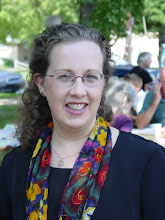The lectionary reading this week is John 20:19-31. It begins: "When it was evening on that day, the first day of the week, and the doors of the house where the disciples had met were locked for fear of the Jews, Jesus came in and stood among them and said, 'Peace be with you.' After he said this, he showed them his hands and his side. Then the disciples rejoiced when they saw the Lord."
The disciples have shut themselves in a room and locked the door. Note John's nonsensical little dig, 'against the Jews'; all of these fellows are also Jews. The community for whom this gospel was written, and in whose shared worship these stories were recited, was being evicted for following the wrong rabbi. They were mad. And they were lost and confused, just as they describe the disciples at this moment. What else do you do, but lock the door?
And Jesus stood among them, and said, 'Peace be with you.' I think of worship services, where we say "Peace be with you" in such pious, church-lady tones. Given this story, maybe it means more than, "Love your hat." The context is terror. The door is locked, John takes pains to say; Jesus doesn't just casually stroll in. There isn't some mistake about whether or not he really died, or perhaps they got the wrong guy. Walking through a locked door is magic. It's a miracle. It is terrifying.
And then he showed them his hands and his side. A real, human, wounded body. He returned from the dead, walked through a locked door, and he was no ghost. He was the one they loved, but he had died. The text says, "They rejoiced," but not without some struggle, I have to think. I am reminded of a documentary in which an Israeli filmmaker crosses into Palestine, and in the course of filming, befriends a Palestinian boy. They are holding hands. The boy is crazy about him. He tells him, "I am an Israeli." "No you're not," says the boy. "Yes, I am." "But you're not a REAL Israeli," he insists. "Yes," the young man says, still holding fast to the boy's hands. "I am really a real Israeli". The astonishment on the boy's face, trying to hold "love" and "Israeli" in one sentence, is sweet.
All these things at once - grief, disbelief, fear, joy, hatred - sometimes are rolled together in a sentence or two. You get them all at once - you have no choice. Peace be with you. You're going to need it.
Tuesday, April 6, 2010
Subscribe to:
Posts (Atom)
